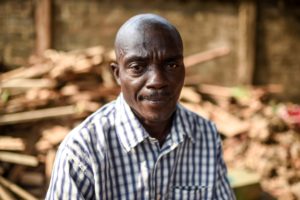When Winston Churchill stood waiting for a train, he tried to make sure there was a pillar between him and the platform edge. He also hated being at the rail of a ship or on a balcony. Yet, he wasn’t afraid of heights: he suffered from bouts of crippling depression, and was terrified of the dark impulse to jump that gripped him.
“A second’s action would end everything. A few drops of desperation,” he reflected.
Churchill described his depression as a black dog that visited him, rendering him silent and exhausted for days or weeks. How did he manage to lead his country through the Second World War, you might wonder? His doctor prescribed him amphetamines, and most historians since then have tried to cover up the scale of his mental health challenges.
A Personal Story

Francis, a fifty-one year old security guard in Sierra Leone, would understand exactly what Churchill meant. The “black dog” arrived in his life when he was forty. But his family showed no interest in helping him because his condition meant he wasn’t contributing to the family finances. When he talks it is clear he is still shocked that his relations were so callous.
Francis became ill during the Ebola epidemic in Sierra Leone in 2014. Doctors immediately assumed he had Ebola, sending him to hospital. But when it became apparent Francis had actually had a stroke, he was sent home. He remained unable to walk for four months, ignored by his nearest and dearest.
Then, he met a social worker from Network for Africa’s local partner, Conforti. Now, he receives counselling and attends a self-help group. He understands that he has a depression so severe it renders him almost unable to function, despite his best efforts to work and learn new skills like carpentry.
“I prefer to keep my feelings secret, except at Conforti,” he says. “Here is the only time I have talked about my feelings.”
The Conforti team acknowledges the challenge it faces in a society where little is understood about mental illness. They train key community members to identify people with mental illness and to provide counselling where appropriate. They also support local social workers and health workers, enabling them to respond in an enlightened manner.
Conforti works in seven areas in Sierra Leone. Its self-help groups are central to helping people like Francis regain control of their lives. Members offer each other mutual support while learning skills that enable them to earn money. They also know they must speak out about mental illness, dispelling the myths and stigma surrounding it.
Francis says, “I have hope because of Confort. It has given me some confidence of better things.”
He has stepped back from the edge of the track.
A visit from Comic Relief
The Conforti team welcomed the CEO of Comic Relief to Sierra Leone in July. She visited the project with a small team to learn more about it, and to see the impact of the work first hand. The Comic Relief team were also accompanied by a representative from the BBC. Network for Africa has recently heard back from Comic Relief – they said that the group had ‘met some incredible people‘ and found ‘the experience inspiring and insightful‘.